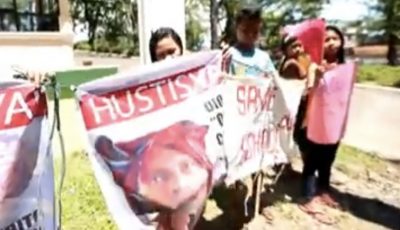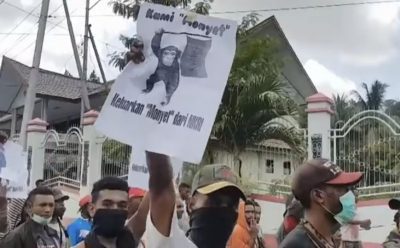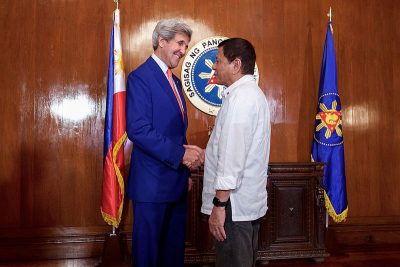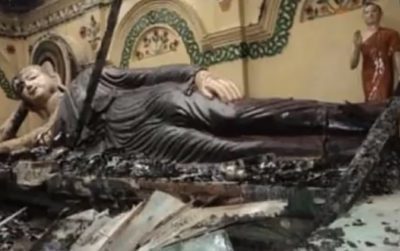Southeast Asia: Crucible of Indigenous Survival
Special Contribution: Gideon Sim

The misleading portrayal of Southeast Asia as an oasis of economic growth and calm in global media belies the boiling over of ethnic tensions and discontent. From Mindanao where Philippine government forces extrajudicially kill indigenous Lumad and Moro minorities; to West Papua where the Indonesian government is fighting indigenous Papuan fighters for independence; to Champa, Kampuchea Krom, and the Central Highlands in Vietnam where indigenous Chams, Degars and Khmer Krom are killed extrajudicially by the police; to the Chittagong Hill Tracts in Bangladesh where the Bangladeshi military, police, and settlers engage in extrajudicial killings and the systematic persecution of indigenous Jumma peoples, the Chakma Buddhists, Marma Buddhists, Tripuri Hindus, Mro and numerous other ethnic minorities.
All of these countries are experiencing economic growth as none of them are sanctioned for their human rights abuses against these ethnic and religious minorities. In the current political environment, ethnic minorities of Southeast Asia have few foreign backers to rely on.
All of the above-mentioned minorities are subjected to persecution and settler colonialism by the Vietnamese Kinh, Bangladeshi Bengali Sunni Muslims, Filipino Visayans, and Indonesian Javanese dominant ethnicities in their countries. Thus the Degars, Chams, Khmer Krom, Lumads, Moros, and Papuans have been reduced to numerical minorities in either all or part of their native lands.
The western media seeks to mask these ethnic conflicts and portray the Middle East as the tinderbox of the world or mention these countries only in the context of the China-US Cold war over the South China Sea and economic investment by China in these nations. However, the indigenous minorities such as the Chams, Khmer Krom, Degars, Moros, and Papuans have directly demanded western nations – including Washington DC – to answer and condemn human rights violations.
This includes Benny Wenda of the Free Papua Movement, the International Office of Champa (IOC), Council of Indigenous Peoples in Today’s Vietnam (CIP TVN), and the Moro National Liberation Front (MNLF). All have demanded the US – and leading democracies – to stop ignoring human rights violations. Some of them, such as the Moros and Degars, have directly mentioned the US-China Cold war as a reason for the US ignoring crimes against them.
PurePapua, the account name of a well known Papuan activist on Twitter has also mentioned China as a reason for Australia’s support of Indonesia. During the Obama administration, he himself in an interview with Jeffery Goldberg’s Atlantic magazine attempted to portray the Middle East as a region of chaos while claiming Southeast Asia was an exemplar of stability and development.

Obama knowingly sold attack helicopters to Indonesia for use in West Papua and his staff sent an automated reply to a letter by the Moro MNLF group, ignoring the contents of the letter and spewing standard template language about peace while not mentioning Moros even once in the reply. America was the country that forcibly included the Moro regions into the Philippines a long time ago by violating the Bates treaty and committing subsequent massacres against them. For example, the infamous Moro Crater massacre which Mark Twain wrote about.
The western neoliberals and neocons support the cause of Rohingya, ethnic Bengali Sunni Muslims against Myanmar – while the same westerners support the persecution of Moro Sunni Muslims in Mindanao by American trained special forces. American news agencies like CNN, Washington Post, New York Times, as well as the British BBC, propagate the idea that Myanmar is a criminal nation while it’s fine for the Philippines, to engage in the persecution of Sunni Muslims. The Moros are an indigenous people of Mindanao and it shows that western neoliberals do not care about Sunni Muslims but rather their own geopolitical interests since the Philippines is a military ally of the United States.
In the case of Indonesia, West Papuans have the support of leftists in Britain including the Labour party and some far-leftists in Australia and New Zealand but no support among leftists in the US and Canada. Britain’s Labour party can afford to criticize Indonesia but due to the large population of South Asian Sunnis in the UK, it is political suicide for Labour to criticize Bangladesh over the Chittagong Hill Tracts. Therefore, both the Labour and Conservative parties in the UK support Bangladesh and have trained its Rapid Action Battalion (RAB) to persecute the Jummas of the Chittagong Hill Tracts over many decades.
In the US and Canada, no criticism of Indonesia, Bangladesh, or the Philippines towards ethnic minorities are allowed at the government level to any major extent. China supported East Timor during the Suharto government but stopped supporting groups in Indonesia after East Timor’s independence and the establishment of diplomatic relations between China and Indonesia.
No political party in any country has ever condemned human rights violations against the Chams despite lobbying by Cham NGOs in the US and at the United Nations. Only a few politicians in Australia and the US have mentioned Degars and Khmer Krom in the context of some of them being former members of the CIDG force during the Vietnam war. Benny Wenda of the Free West Papua movement has lobbied in Washington DC as the Chams have. However, the US has refused to condemn Indonesia, Vietnam, and Bangladesh over human rights abuses.
US politicians have attacked Duterte over his drug war as a cover for their dislike over his policies diverting from his pro-US predecessor Aquino. Yet none of them have criticized the Philippine military’s persecution of the Lumads and Moros since the US government strongly supports these policies.

Human rights “leaders” like Ken Roth and the US government oppose Duterte in the Philippines and the Hasina Awami League government in Bangladesh, not because of the persecution of minorities such as Jummas, Lumads, and Chams, but over other issues. For example, they have condemned Bangladesh and the Philippines because Duterte attacked Obama and the Awami League’s hanging of Jamiat e Islami leaders and suppression of the Bangladesh Nationalist Party (BNP).
Much like Ken Roth and many US politicians oppose President Sisi in Egypt for his repression of Muslim Brotherhood members, not for his human rights abuses of Coptic Christians. The ruling party and opposition in those countries all support the persecution of minorities to various degrees. For example, the Bangladesh Nationalist Party and Bangladesh Awami League both support Bengalis to usurp power away from the indigenous Jummas in the Chittagong Hill Tracts. Similarly, Duterte and his pro-US predecessor Aquino supported the persecution of indigenous Lumads and Moros in Mindanao based on centralized power. Therefore, a similar pattern is continuing just like Communist Vietnam and South Vietnam engaged in repression and the persecution of Chams, Khmer Krom, and Degars.
Equally, why does the US government-backed Radio Free Asia have a Vietnamese language section staffed by South Vietnamese exiles but no Cham or Degar language broadcasting?
The minority Chams, Khmer Krom, and Degar founded the FULRO movement to fight for independence against the South Vietnamese, the US, and the North Vietnamese in history. Meanwhile, Vietnam’s Communist government attempts to draw support from all the major world powers at once rather than one.
In recent times the Degars have complained that America has deliberately ignored them to curry favor with Vietnam against China. Similarly, repeated attempts by Cham NGOs to lobby for attention to human rights concerns – including extrajudicial killings by the Vietnamese police against Chams as well as the destruction of Champa’s Hindu cultural heritage – have been ignored by the west.
Cham Hindu temples have been demolished in Vietnam in recent history. While the persecution of the Cham is ongoing in Vietnam. During the Second Indochina war (so-called “Vietnam war” by the US), the US founded the rival CIDG group to attempt to draw support away from FULRO. However, it failed as members of CIDG left to join FULRO rather than vice versa.

The Khmer Krom are Theravada Buddhists – the Chams are Hindus, Sunni Muslims, or follow a hybrid religion of the two – and Degars are animists and Christian. The Vietnamese conquest of Champa in 1832 resulted in Cham Hindus being forced to eat beef and Cham Muslims to eat pork beside the slaughter and destruction of cities. Hence, some Cham Sunni Muslims fled the Vietnamese invasion to seek asylum in Sanya, Hainan, and other parts of China.
India instructed the Jummas in the Shanti Bahini – that it formerly supported – to lay down their military arms in 1997 after PM Hasina’s Awami League government came to power in 1996. India did this after achieving its desired result of pressuring the BNP and other anti-India governments in Bangladesh during the insurgency.
Since then the indigenous peoples of the Chittagong Hill Tracts have gone unsupported by all countries. Bangladesh has continued its campaign of colonial settlements of Bengali Muslim colonists in the Chittagong Hill Tracts.
The upshot is to marginalize and destroy the indigenous Jumma peoples, the Chakma Buddhists, Marma Buddhists, Tripuri Hindus, Mro, and numerous other ethnicities. Buddhists among the Jumma follow the Theravada school. Tragically, the Chittagong Hill Tracts was included in East Pakistan in 1947, later to become Bangladesh despite being 97% Buddhist at the time, now reduced to 34%.
China has consistently refused to support ethnic minorities and movements in US client regimes since the end of the first Cold War. During the Cold War, China supported the East Timorese independence movement while the US, UK, and Australia supported the Suharto government in Indonesia.
China has since then stopped supporting movements in Indonesia after East Timor’s independence and the establishment of diplomatic relations with Indonesia. Also, China has increased investment in Indonesia since then despite Indonesia’s military maintaining close ties to the US and Australia.

China has instead invested heavily in Indonesia, Bangladesh, Vietnam, and the Philippines. This is a far cry from the days of the Song dynasty and the Ming dynasty when China militarily supported Champa against Vietnam with weapons shipments and direct military support in coordinated warfare. The MNLF expressed desire on their website for China to enter the fray against America’s ally in the Philippines, President Benigno Aquino III on their side. Yet this was largely ignored by China.
Likewise, the former Cham fighter Po Dharma rebuked Vietnam for misleadingly using a Cham document in its dispute with China over several South China Sea islands but this was ignored by China again. Thus, China’s declared geopolitical policy towards the third world is a heavy investment to draw them economically closer to Beijing despite military ties with the US. Thereby leaving different ethnic and religious groups with no major power to confront US-supported governments.
Major western and Asian media have refused to carry stories on the plight of these ethnic minorities to any serious degree. In this context, these minorities have few options.
One of them is coordinated social media efforts combined with publishing in alternative media. The Lumads have not taken up arms and the Jummas, Degars, Khmer Krom, and Chams put down their arms in the 1990s. Despite this, none of them have seen the repression against them cease.
In this context, it seems unlikely the Papuan and Moro groups like MNLF will ever lay down their arms. Thus the fantasy of uninterrupted economic growth and stability in Southeast Asia will always remain elusive in areas blighted by important ethnic and religious issues.
Such attempts and wishful thinking by American administrations that Southeast Asia will see uninterrupted economic growth – in contrast to the Middle East – will not face the test of reality. Ignoring human rights violations does not mean that their victims, such as the Papuans, will put their arms down.
The administration of Obama hoped that the Philippine President Benigno Aquino III’s peace deal with the Moro MILF group, during his second term, would end internal insurgency in the Philippines and leave it to focus on China instead. Obama ignored the other Moro group MNLF warning of impending warfare against his ally President Benigno Aquino III in the Philippines on the MNLF’s official website months before their uprising in Zamboanga city in 2013. Thus the battle with the Philippine military effectively destroyed his vaunted pivot to the Asia-Pacific region against China during his administration.
This indicates a broader arrogance on the part of American planners at the top levels of government to ignore reality. Indeed, the enemy was providing free intelligence on its public platform by warning that they would attack the Philippine state.
Such unimpeded arrogance continues to be the mark of American policy towards the Southeast Asian region. Hence, how can America confront China when it ignored clear signs of an impending battle?
Even approaching this from a neutral point of view, denial of reality is not a good way for American political planners to push their self-interests when so many indigenous groups are fighting for survival.
This is a special contribution written by Gideon Sim
Modern Tokyo Times publishes special contributions in the area of culture and geopolitics.